Entrepreneurship & Small Business Management: Growth Factors
VerifiedAdded on 2021/02/20
|16
|4385
|41
Report
AI Summary
This report provides a comprehensive analysis of entrepreneurship and small business management, covering various aspects such as entrepreneurial ventures (innovative, copycat, social), entrepreneurial topology (lifestyle, survival, growth), and the roles of different types of entrepreneurs (serial, intrapreneurs, owner managers). It also explores the factors influencing SME growth in the UK economy, including the impact of Brexit, and discusses the importance of small and start-up businesses in boosting the local economy. Furthermore, the report touches upon the characteristics, traits, and skills required for successful entrepreneurship, highlighting the distinctions between entrepreneurs and business managers. The significance of social economy and its contribution to national, regional, and local levels are also discussed.

Entrepreneurship and Small
Business Management
Business Management
Paraphrase This Document
Need a fresh take? Get an instant paraphrase of this document with our AI Paraphraser

Table of Contents
INTRODUCTION...........................................................................................................................3
TASK 1............................................................................................................................................3
P1............................................................................................................................................3
P2 ...........................................................................................................................................5
TASK 2............................................................................................................................................6
P3 ...........................................................................................................................................6
P4 ...........................................................................................................................................9
TASK 3..........................................................................................................................................10
P5 .........................................................................................................................................10
P6 .........................................................................................................................................13
CONCLUSION..............................................................................................................................14
RECOMMENDATION.................................................................................................................14
REFERENCES..............................................................................................................................15
INTRODUCTION...........................................................................................................................3
TASK 1............................................................................................................................................3
P1............................................................................................................................................3
P2 ...........................................................................................................................................5
TASK 2............................................................................................................................................6
P3 ...........................................................................................................................................6
P4 ...........................................................................................................................................9
TASK 3..........................................................................................................................................10
P5 .........................................................................................................................................10
P6 .........................................................................................................................................13
CONCLUSION..............................................................................................................................14
RECOMMENDATION.................................................................................................................14
REFERENCES..............................................................................................................................15
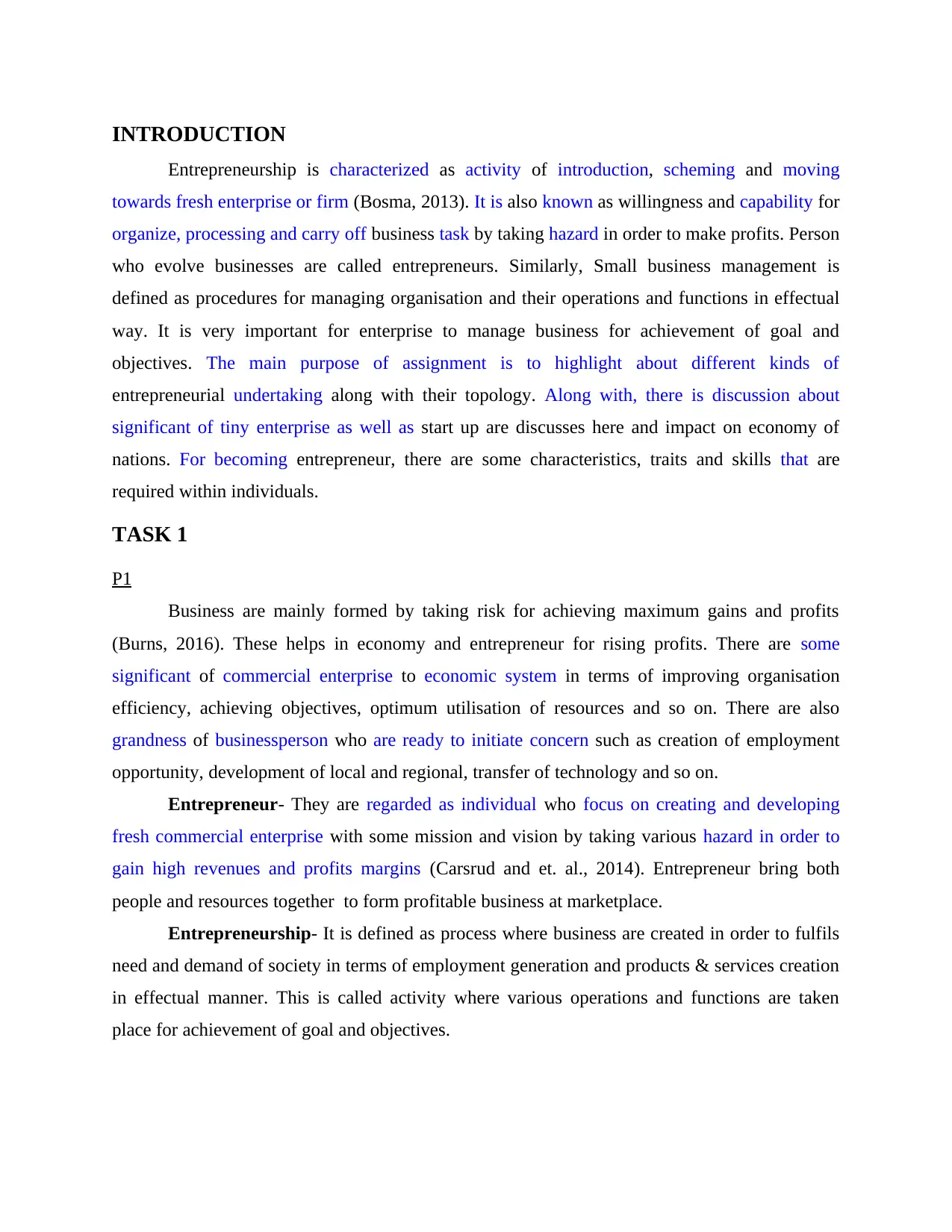
INTRODUCTION
Entrepreneurship is characterized as activity of introduction, scheming and moving
towards fresh enterprise or firm (Bosma, 2013). It is also known as willingness and capability for
organize, processing and carry off business task by taking hazard in order to make profits. Person
who evolve businesses are called entrepreneurs. Similarly, Small business management is
defined as procedures for managing organisation and their operations and functions in effectual
way. It is very important for enterprise to manage business for achievement of goal and
objectives. The main purpose of assignment is to highlight about different kinds of
entrepreneurial undertaking along with their topology. Along with, there is discussion about
significant of tiny enterprise as well as start up are discusses here and impact on economy of
nations. For becoming entrepreneur, there are some characteristics, traits and skills that are
required within individuals.
TASK 1
P1
Business are mainly formed by taking risk for achieving maximum gains and profits
(Burns, 2016). These helps in economy and entrepreneur for rising profits. There are some
significant of commercial enterprise to economic system in terms of improving organisation
efficiency, achieving objectives, optimum utilisation of resources and so on. There are also
grandness of businessperson who are ready to initiate concern such as creation of employment
opportunity, development of local and regional, transfer of technology and so on.
Entrepreneur- They are regarded as individual who focus on creating and developing
fresh commercial enterprise with some mission and vision by taking various hazard in order to
gain high revenues and profits margins (Carsrud and et. al., 2014). Entrepreneur bring both
people and resources together to form profitable business at marketplace.
Entrepreneurship- It is defined as process where business are created in order to fulfils
need and demand of society in terms of employment generation and products & services creation
in effectual manner. This is called activity where various operations and functions are taken
place for achievement of goal and objectives.
Entrepreneurship is characterized as activity of introduction, scheming and moving
towards fresh enterprise or firm (Bosma, 2013). It is also known as willingness and capability for
organize, processing and carry off business task by taking hazard in order to make profits. Person
who evolve businesses are called entrepreneurs. Similarly, Small business management is
defined as procedures for managing organisation and their operations and functions in effectual
way. It is very important for enterprise to manage business for achievement of goal and
objectives. The main purpose of assignment is to highlight about different kinds of
entrepreneurial undertaking along with their topology. Along with, there is discussion about
significant of tiny enterprise as well as start up are discusses here and impact on economy of
nations. For becoming entrepreneur, there are some characteristics, traits and skills that are
required within individuals.
TASK 1
P1
Business are mainly formed by taking risk for achieving maximum gains and profits
(Burns, 2016). These helps in economy and entrepreneur for rising profits. There are some
significant of commercial enterprise to economic system in terms of improving organisation
efficiency, achieving objectives, optimum utilisation of resources and so on. There are also
grandness of businessperson who are ready to initiate concern such as creation of employment
opportunity, development of local and regional, transfer of technology and so on.
Entrepreneur- They are regarded as individual who focus on creating and developing
fresh commercial enterprise with some mission and vision by taking various hazard in order to
gain high revenues and profits margins (Carsrud and et. al., 2014). Entrepreneur bring both
people and resources together to form profitable business at marketplace.
Entrepreneurship- It is defined as process where business are created in order to fulfils
need and demand of society in terms of employment generation and products & services creation
in effectual manner. This is called activity where various operations and functions are taken
place for achievement of goal and objectives.
⊘ This is a preview!⊘
Do you want full access?
Subscribe today to unlock all pages.

Trusted by 1+ million students worldwide
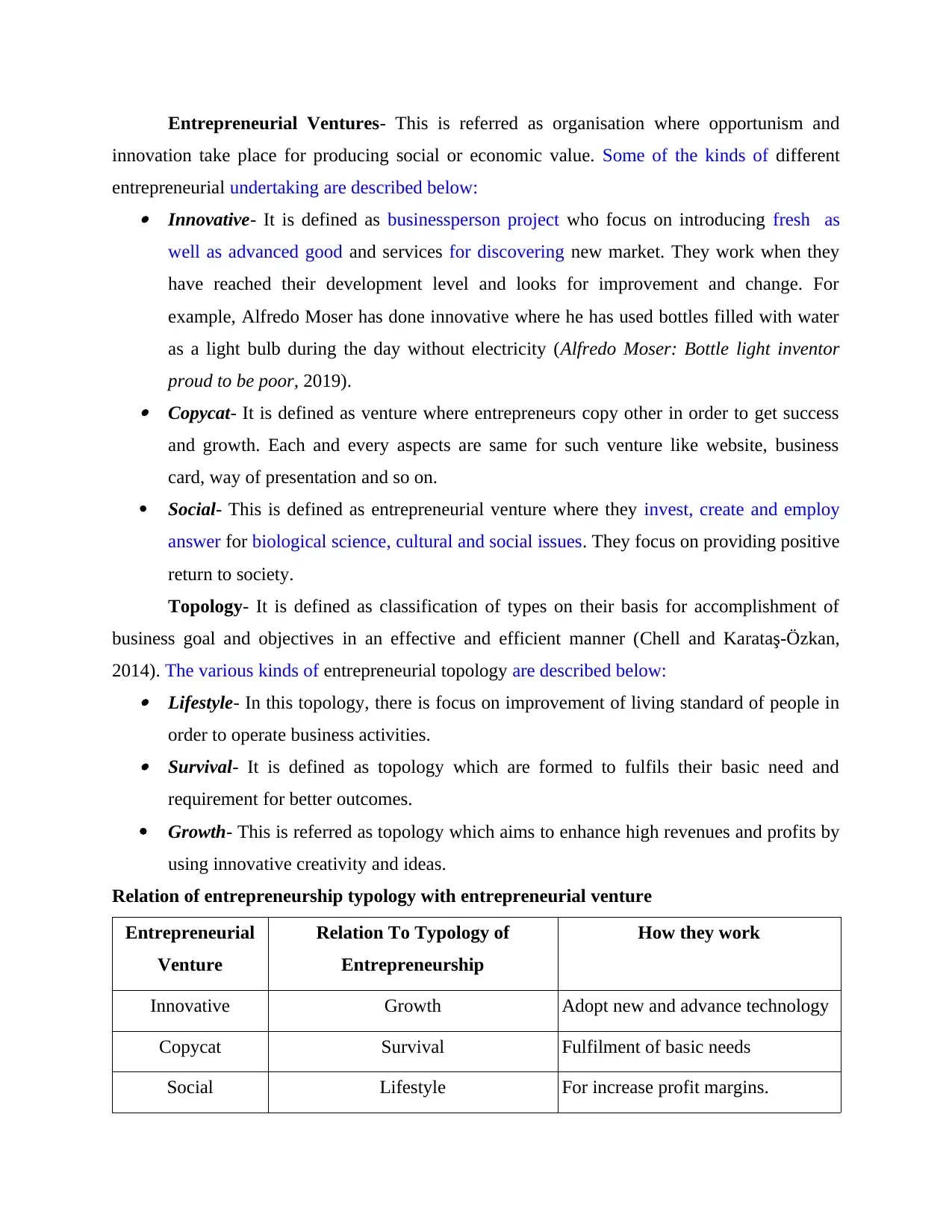
Entrepreneurial Ventures- This is referred as organisation where opportunism and
innovation take place for producing social or economic value. Some of the kinds of different
entrepreneurial undertaking are described below: Innovative- It is defined as businessperson project who focus on introducing fresh as
well as advanced good and services for discovering new market. They work when they
have reached their development level and looks for improvement and change. For
example, Alfredo Moser has done innovative where he has used bottles filled with water
as a light bulb during the day without electricity (Alfredo Moser: Bottle light inventor
proud to be poor, 2019). Copycat- It is defined as venture where entrepreneurs copy other in order to get success
and growth. Each and every aspects are same for such venture like website, business
card, way of presentation and so on.
Social- This is defined as entrepreneurial venture where they invest, create and employ
answer for biological science, cultural and social issues. They focus on providing positive
return to society.
Topology- It is defined as classification of types on their basis for accomplishment of
business goal and objectives in an effective and efficient manner (Chell and Karataş-Özkan,
2014). The various kinds of entrepreneurial topology are described below: Lifestyle- In this topology, there is focus on improvement of living standard of people in
order to operate business activities. Survival- It is defined as topology which are formed to fulfils their basic need and
requirement for better outcomes.
Growth- This is referred as topology which aims to enhance high revenues and profits by
using innovative creativity and ideas.
Relation of entrepreneurship typology with entrepreneurial venture
Entrepreneurial
Venture
Relation To Typology of
Entrepreneurship
How they work
Innovative Growth Adopt new and advance technology
Copycat Survival Fulfilment of basic needs
Social Lifestyle For increase profit margins.
innovation take place for producing social or economic value. Some of the kinds of different
entrepreneurial undertaking are described below: Innovative- It is defined as businessperson project who focus on introducing fresh as
well as advanced good and services for discovering new market. They work when they
have reached their development level and looks for improvement and change. For
example, Alfredo Moser has done innovative where he has used bottles filled with water
as a light bulb during the day without electricity (Alfredo Moser: Bottle light inventor
proud to be poor, 2019). Copycat- It is defined as venture where entrepreneurs copy other in order to get success
and growth. Each and every aspects are same for such venture like website, business
card, way of presentation and so on.
Social- This is defined as entrepreneurial venture where they invest, create and employ
answer for biological science, cultural and social issues. They focus on providing positive
return to society.
Topology- It is defined as classification of types on their basis for accomplishment of
business goal and objectives in an effective and efficient manner (Chell and Karataş-Özkan,
2014). The various kinds of entrepreneurial topology are described below: Lifestyle- In this topology, there is focus on improvement of living standard of people in
order to operate business activities. Survival- It is defined as topology which are formed to fulfils their basic need and
requirement for better outcomes.
Growth- This is referred as topology which aims to enhance high revenues and profits by
using innovative creativity and ideas.
Relation of entrepreneurship typology with entrepreneurial venture
Entrepreneurial
Venture
Relation To Typology of
Entrepreneurship
How they work
Innovative Growth Adopt new and advance technology
Copycat Survival Fulfilment of basic needs
Social Lifestyle For increase profit margins.
Paraphrase This Document
Need a fresh take? Get an instant paraphrase of this document with our AI Paraphraser
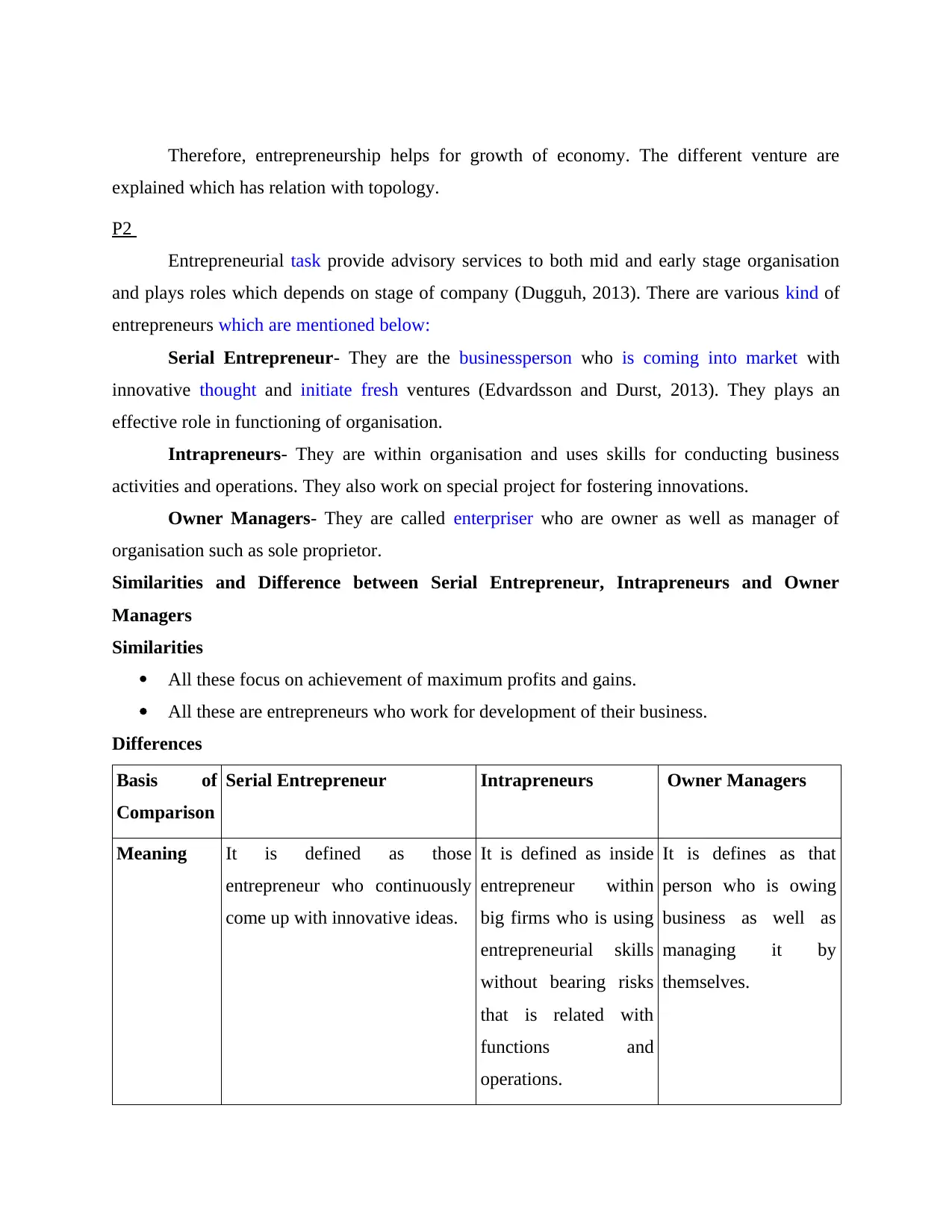
Therefore, entrepreneurship helps for growth of economy. The different venture are
explained which has relation with topology.
P2
Entrepreneurial task provide advisory services to both mid and early stage organisation
and plays roles which depends on stage of company (Dugguh, 2013). There are various kind of
entrepreneurs which are mentioned below:
Serial Entrepreneur- They are the businessperson who is coming into market with
innovative thought and initiate fresh ventures (Edvardsson and Durst, 2013). They plays an
effective role in functioning of organisation.
Intrapreneurs- They are within organisation and uses skills for conducting business
activities and operations. They also work on special project for fostering innovations.
Owner Managers- They are called enterpriser who are owner as well as manager of
organisation such as sole proprietor.
Similarities and Difference between Serial Entrepreneur, Intrapreneurs and Owner
Managers
Similarities
All these focus on achievement of maximum profits and gains.
All these are entrepreneurs who work for development of their business.
Differences
Basis of
Comparison
Serial Entrepreneur Intrapreneurs Owner Managers
Meaning It is defined as those
entrepreneur who continuously
come up with innovative ideas.
It is defined as inside
entrepreneur within
big firms who is using
entrepreneurial skills
without bearing risks
that is related with
functions and
operations.
It is defines as that
person who is owing
business as well as
managing it by
themselves.
explained which has relation with topology.
P2
Entrepreneurial task provide advisory services to both mid and early stage organisation
and plays roles which depends on stage of company (Dugguh, 2013). There are various kind of
entrepreneurs which are mentioned below:
Serial Entrepreneur- They are the businessperson who is coming into market with
innovative thought and initiate fresh ventures (Edvardsson and Durst, 2013). They plays an
effective role in functioning of organisation.
Intrapreneurs- They are within organisation and uses skills for conducting business
activities and operations. They also work on special project for fostering innovations.
Owner Managers- They are called enterpriser who are owner as well as manager of
organisation such as sole proprietor.
Similarities and Difference between Serial Entrepreneur, Intrapreneurs and Owner
Managers
Similarities
All these focus on achievement of maximum profits and gains.
All these are entrepreneurs who work for development of their business.
Differences
Basis of
Comparison
Serial Entrepreneur Intrapreneurs Owner Managers
Meaning It is defined as those
entrepreneur who continuously
come up with innovative ideas.
It is defined as inside
entrepreneur within
big firms who is using
entrepreneurial skills
without bearing risks
that is related with
functions and
operations.
It is defines as that
person who is owing
business as well as
managing it by
themselves.
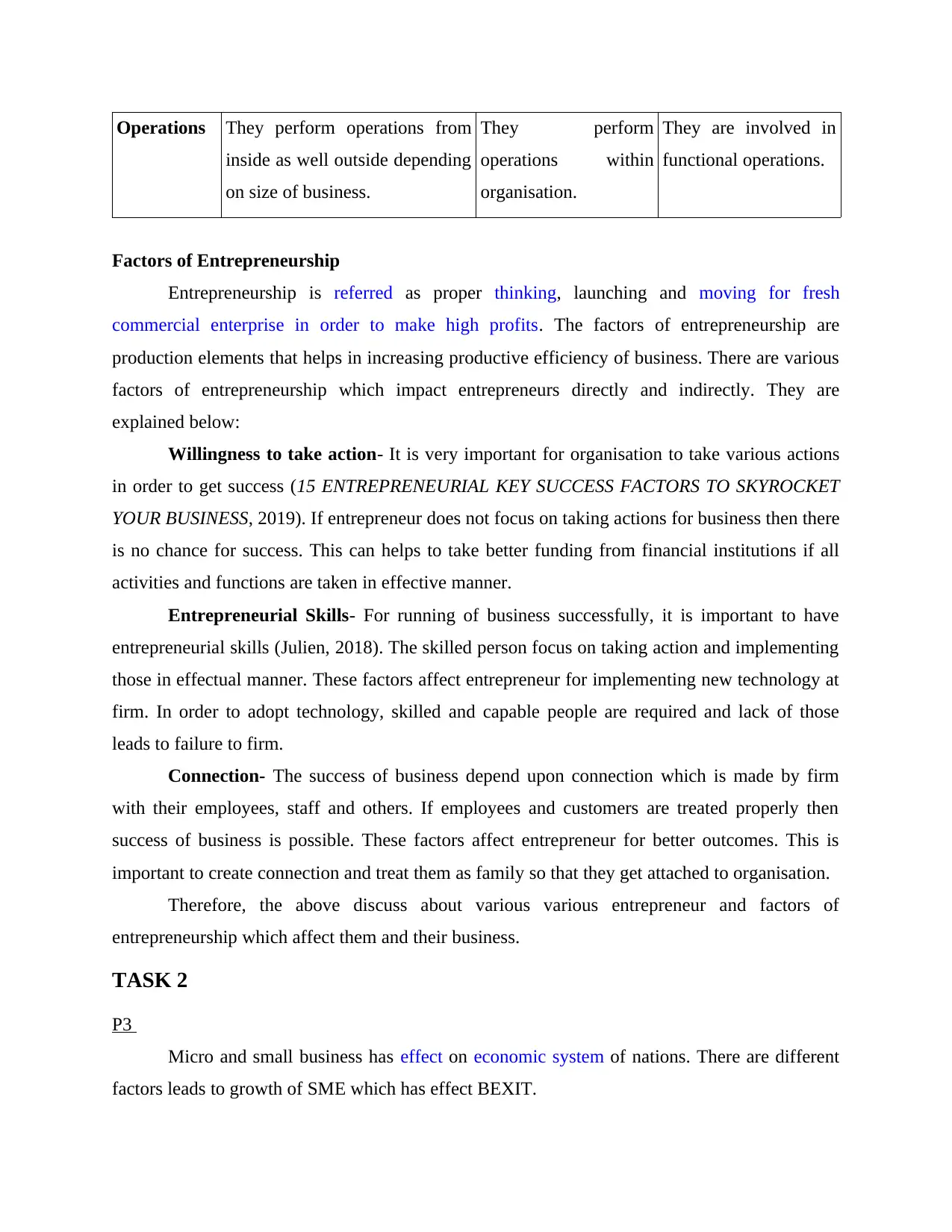
Operations They perform operations from
inside as well outside depending
on size of business.
They perform
operations within
organisation.
They are involved in
functional operations.
Factors of Entrepreneurship
Entrepreneurship is referred as proper thinking, launching and moving for fresh
commercial enterprise in order to make high profits. The factors of entrepreneurship are
production elements that helps in increasing productive efficiency of business. There are various
factors of entrepreneurship which impact entrepreneurs directly and indirectly. They are
explained below:
Willingness to take action- It is very important for organisation to take various actions
in order to get success (15 ENTREPRENEURIAL KEY SUCCESS FACTORS TO SKYROCKET
YOUR BUSINESS, 2019). If entrepreneur does not focus on taking actions for business then there
is no chance for success. This can helps to take better funding from financial institutions if all
activities and functions are taken in effective manner.
Entrepreneurial Skills- For running of business successfully, it is important to have
entrepreneurial skills (Julien, 2018). The skilled person focus on taking action and implementing
those in effectual manner. These factors affect entrepreneur for implementing new technology at
firm. In order to adopt technology, skilled and capable people are required and lack of those
leads to failure to firm.
Connection- The success of business depend upon connection which is made by firm
with their employees, staff and others. If employees and customers are treated properly then
success of business is possible. These factors affect entrepreneur for better outcomes. This is
important to create connection and treat them as family so that they get attached to organisation.
Therefore, the above discuss about various various entrepreneur and factors of
entrepreneurship which affect them and their business.
TASK 2
P3
Micro and small business has effect on economic system of nations. There are different
factors leads to growth of SME which has effect BEXIT.
inside as well outside depending
on size of business.
They perform
operations within
organisation.
They are involved in
functional operations.
Factors of Entrepreneurship
Entrepreneurship is referred as proper thinking, launching and moving for fresh
commercial enterprise in order to make high profits. The factors of entrepreneurship are
production elements that helps in increasing productive efficiency of business. There are various
factors of entrepreneurship which impact entrepreneurs directly and indirectly. They are
explained below:
Willingness to take action- It is very important for organisation to take various actions
in order to get success (15 ENTREPRENEURIAL KEY SUCCESS FACTORS TO SKYROCKET
YOUR BUSINESS, 2019). If entrepreneur does not focus on taking actions for business then there
is no chance for success. This can helps to take better funding from financial institutions if all
activities and functions are taken in effective manner.
Entrepreneurial Skills- For running of business successfully, it is important to have
entrepreneurial skills (Julien, 2018). The skilled person focus on taking action and implementing
those in effectual manner. These factors affect entrepreneur for implementing new technology at
firm. In order to adopt technology, skilled and capable people are required and lack of those
leads to failure to firm.
Connection- The success of business depend upon connection which is made by firm
with their employees, staff and others. If employees and customers are treated properly then
success of business is possible. These factors affect entrepreneur for better outcomes. This is
important to create connection and treat them as family so that they get attached to organisation.
Therefore, the above discuss about various various entrepreneur and factors of
entrepreneurship which affect them and their business.
TASK 2
P3
Micro and small business has effect on economic system of nations. There are different
factors leads to growth of SME which has effect BEXIT.
⊘ This is a preview!⊘
Do you want full access?
Subscribe today to unlock all pages.

Trusted by 1+ million students worldwide

Micro Business- It is outlined as companies that has assets and annual sales less than
value of $250,000 per annum and possess less than five employees which includes owner.
Small Business- It is operated and owned company which has small size and revenue
depends upon industry (Piperopoulos and Dimov, 2015). The different kinds of small enterprise
includes bakery, photography and so on.
Factors behind growth of small and micro business in UK economy
There are various component behind growing of tiny and little business enterprise in UK
economy. They are as follows:
Profit- In 2016, the profit or yearly turnover rate in UK by SME is £1.9 million which
contribute 51% of private sectors. As per size of business, profits margin is differed from one
another.
Turnover - SME has played an effective role in increasing turnover of different sectors
(Ramadani, 2013). There are 74% business which deals in service industry but only 18% of
Illustration 1: Average Profit Of SMEs with a Turnover of Less Than £25M Q4 2014
to Q4 2016.
(Source: Average Profit Of SMEs with a Turnover of Less Than £25M Q4 2014 to Q4
2016, 2019)
value of $250,000 per annum and possess less than five employees which includes owner.
Small Business- It is operated and owned company which has small size and revenue
depends upon industry (Piperopoulos and Dimov, 2015). The different kinds of small enterprise
includes bakery, photography and so on.
Factors behind growth of small and micro business in UK economy
There are various component behind growing of tiny and little business enterprise in UK
economy. They are as follows:
Profit- In 2016, the profit or yearly turnover rate in UK by SME is £1.9 million which
contribute 51% of private sectors. As per size of business, profits margin is differed from one
another.
Turnover - SME has played an effective role in increasing turnover of different sectors
(Ramadani, 2013). There are 74% business which deals in service industry but only 18% of
Illustration 1: Average Profit Of SMEs with a Turnover of Less Than £25M Q4 2014
to Q4 2016.
(Source: Average Profit Of SMEs with a Turnover of Less Than £25M Q4 2014 to Q4
2016, 2019)
Paraphrase This Document
Need a fresh take? Get an instant paraphrase of this document with our AI Paraphraser
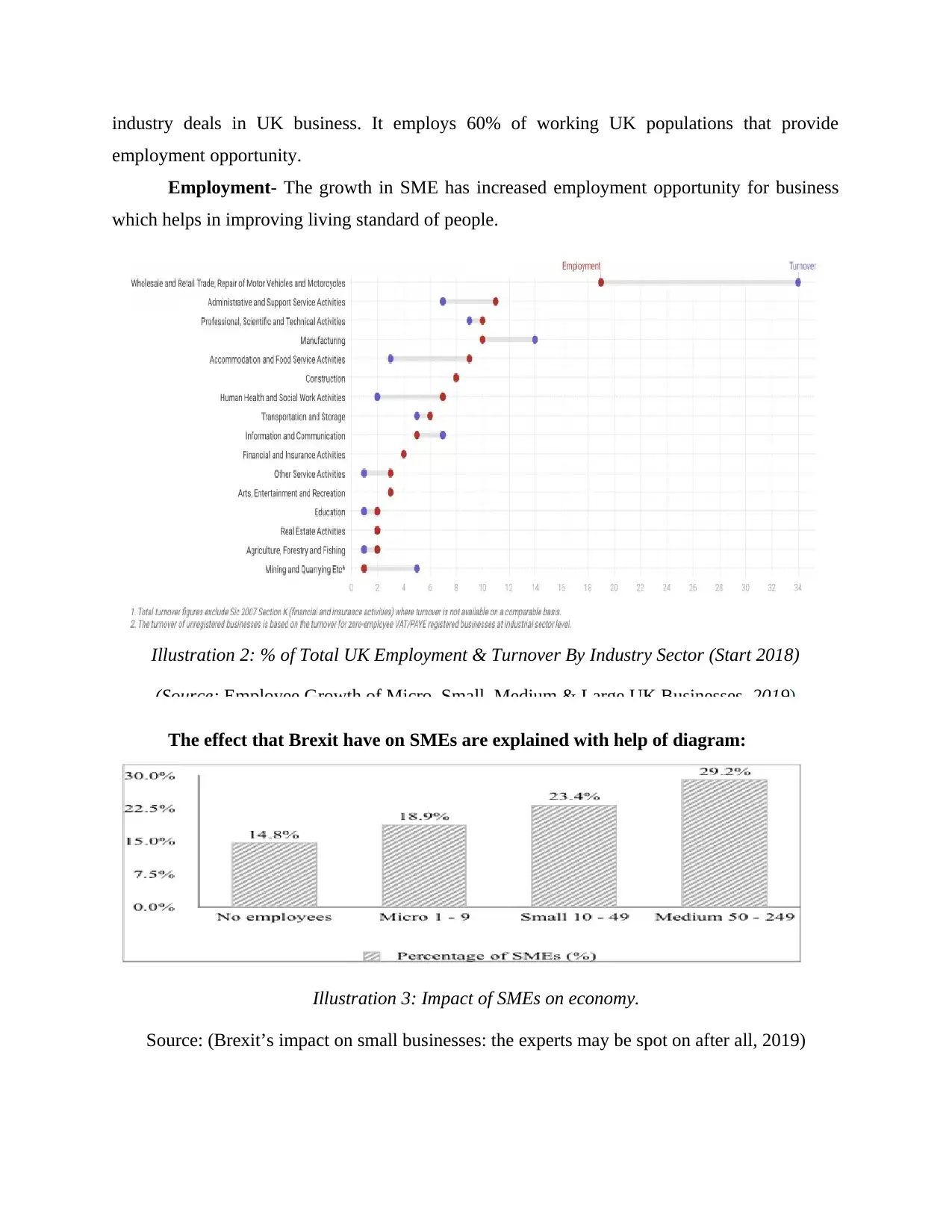
industry deals in UK business. It employs 60% of working UK populations that provide
employment opportunity.
Employment- The growth in SME has increased employment opportunity for business
which helps in improving living standard of people.
The effect that Brexit have on SMEs are explained with help of diagram:
Illustration 3: Impact of SMEs on economy.
Source: (Brexit’s impact on small businesses: the experts may be spot on after all, 2019)
Illustration 2: % of Total UK Employment & Turnover By Industry Sector (Start 2018)
(Source: Employee Growth of Micro, Small, Medium & Large UK Businesses, 2019)
employment opportunity.
Employment- The growth in SME has increased employment opportunity for business
which helps in improving living standard of people.
The effect that Brexit have on SMEs are explained with help of diagram:
Illustration 3: Impact of SMEs on economy.
Source: (Brexit’s impact on small businesses: the experts may be spot on after all, 2019)
Illustration 2: % of Total UK Employment & Turnover By Industry Sector (Start 2018)
(Source: Employee Growth of Micro, Small, Medium & Large UK Businesses, 2019)
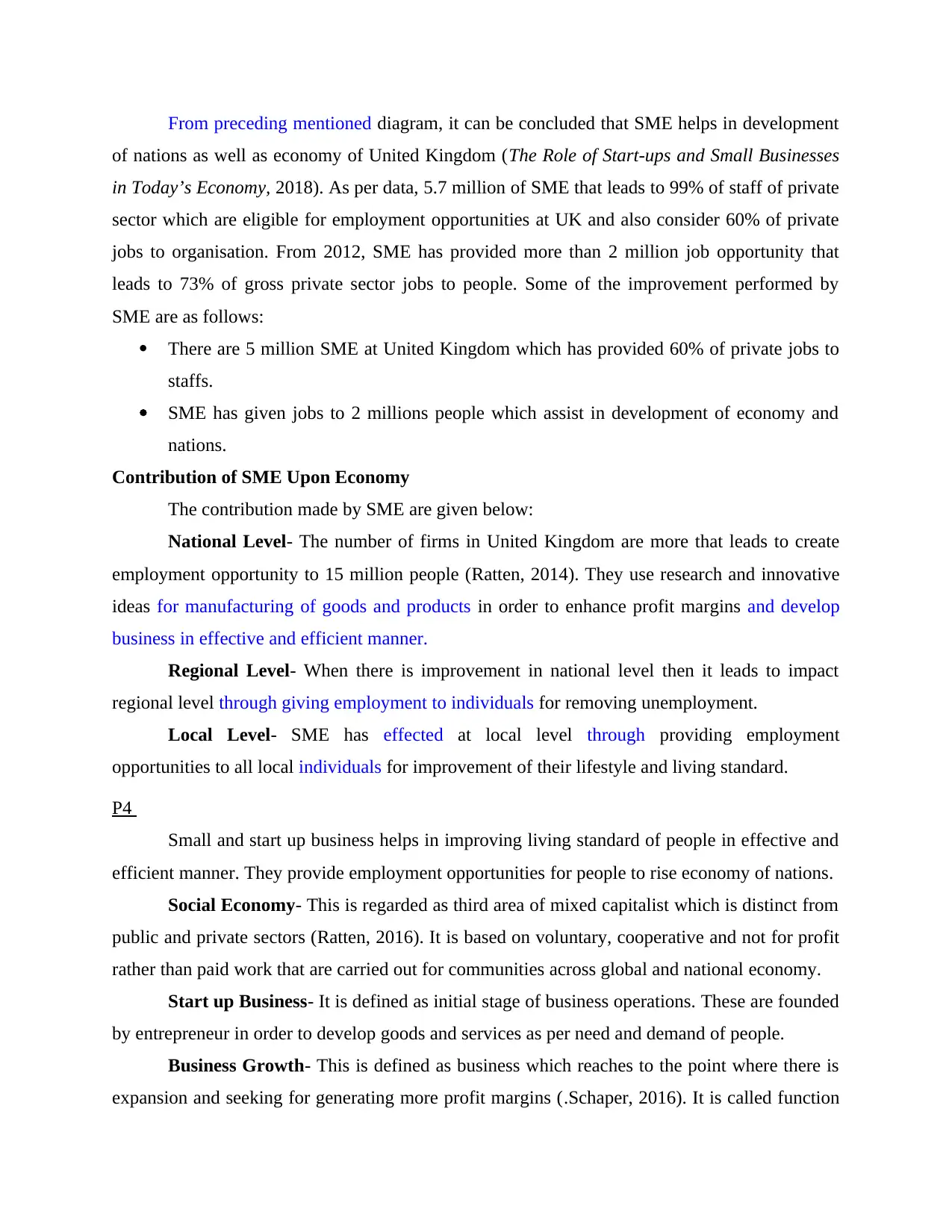
From preceding mentioned diagram, it can be concluded that SME helps in development
of nations as well as economy of United Kingdom (The Role of Start-ups and Small Businesses
in Today’s Economy, 2018). As per data, 5.7 million of SME that leads to 99% of staff of private
sector which are eligible for employment opportunities at UK and also consider 60% of private
jobs to organisation. From 2012, SME has provided more than 2 million job opportunity that
leads to 73% of gross private sector jobs to people. Some of the improvement performed by
SME are as follows:
There are 5 million SME at United Kingdom which has provided 60% of private jobs to
staffs.
SME has given jobs to 2 millions people which assist in development of economy and
nations.
Contribution of SME Upon Economy
The contribution made by SME are given below:
National Level- The number of firms in United Kingdom are more that leads to create
employment opportunity to 15 million people (Ratten, 2014). They use research and innovative
ideas for manufacturing of goods and products in order to enhance profit margins and develop
business in effective and efficient manner.
Regional Level- When there is improvement in national level then it leads to impact
regional level through giving employment to individuals for removing unemployment.
Local Level- SME has effected at local level through providing employment
opportunities to all local individuals for improvement of their lifestyle and living standard.
P4
Small and start up business helps in improving living standard of people in effective and
efficient manner. They provide employment opportunities for people to rise economy of nations.
Social Economy- This is regarded as third area of mixed capitalist which is distinct from
public and private sectors (Ratten, 2016). It is based on voluntary, cooperative and not for profit
rather than paid work that are carried out for communities across global and national economy.
Start up Business- It is defined as initial stage of business operations. These are founded
by entrepreneur in order to develop goods and services as per need and demand of people.
Business Growth- This is defined as business which reaches to the point where there is
expansion and seeking for generating more profit margins (.Schaper, 2016). It is called function
of nations as well as economy of United Kingdom (The Role of Start-ups and Small Businesses
in Today’s Economy, 2018). As per data, 5.7 million of SME that leads to 99% of staff of private
sector which are eligible for employment opportunities at UK and also consider 60% of private
jobs to organisation. From 2012, SME has provided more than 2 million job opportunity that
leads to 73% of gross private sector jobs to people. Some of the improvement performed by
SME are as follows:
There are 5 million SME at United Kingdom which has provided 60% of private jobs to
staffs.
SME has given jobs to 2 millions people which assist in development of economy and
nations.
Contribution of SME Upon Economy
The contribution made by SME are given below:
National Level- The number of firms in United Kingdom are more that leads to create
employment opportunity to 15 million people (Ratten, 2014). They use research and innovative
ideas for manufacturing of goods and products in order to enhance profit margins and develop
business in effective and efficient manner.
Regional Level- When there is improvement in national level then it leads to impact
regional level through giving employment to individuals for removing unemployment.
Local Level- SME has effected at local level through providing employment
opportunities to all local individuals for improvement of their lifestyle and living standard.
P4
Small and start up business helps in improving living standard of people in effective and
efficient manner. They provide employment opportunities for people to rise economy of nations.
Social Economy- This is regarded as third area of mixed capitalist which is distinct from
public and private sectors (Ratten, 2016). It is based on voluntary, cooperative and not for profit
rather than paid work that are carried out for communities across global and national economy.
Start up Business- It is defined as initial stage of business operations. These are founded
by entrepreneur in order to develop goods and services as per need and demand of people.
Business Growth- This is defined as business which reaches to the point where there is
expansion and seeking for generating more profit margins (.Schaper, 2016). It is called function
⊘ This is a preview!⊘
Do you want full access?
Subscribe today to unlock all pages.

Trusted by 1+ million students worldwide
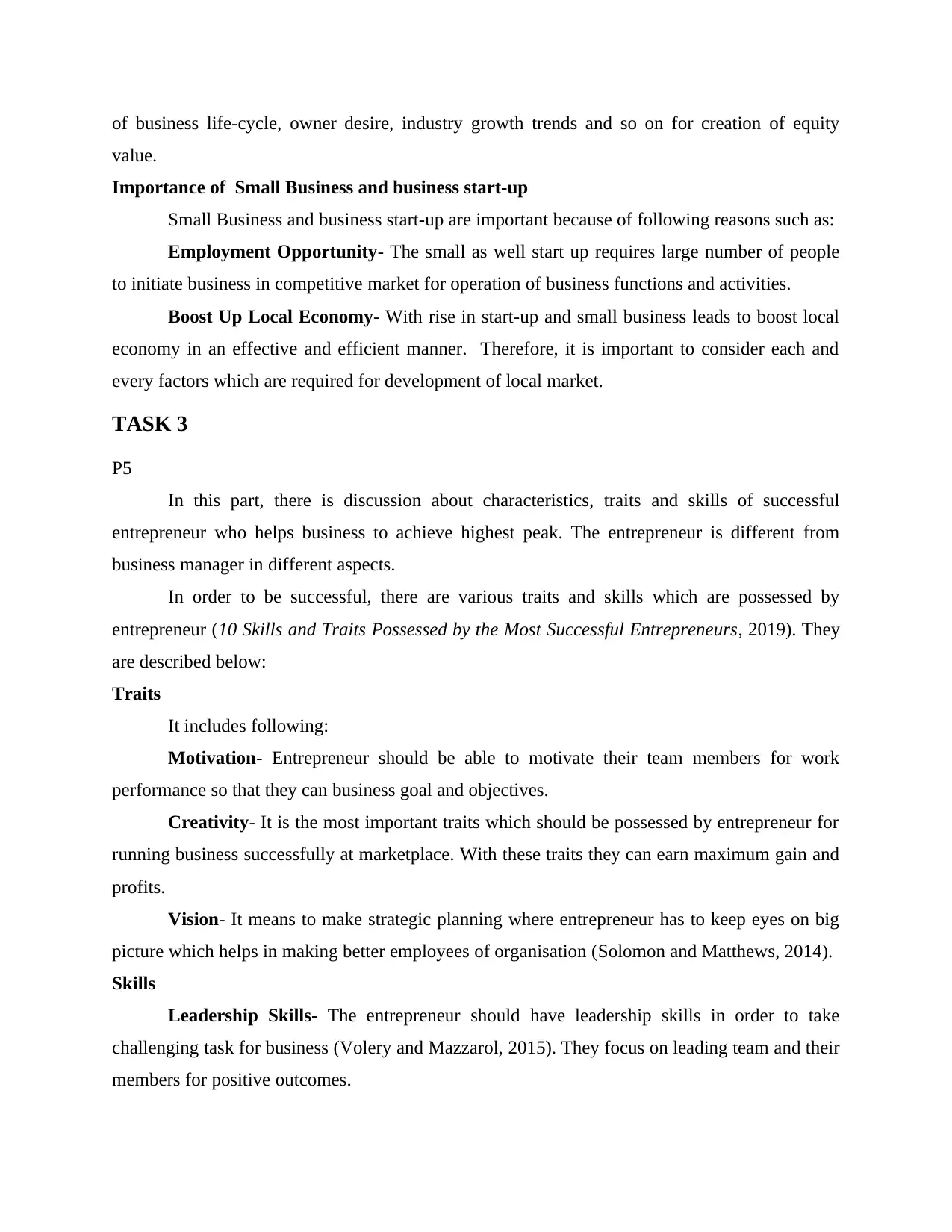
of business life-cycle, owner desire, industry growth trends and so on for creation of equity
value.
Importance of Small Business and business start-up
Small Business and business start-up are important because of following reasons such as:
Employment Opportunity- The small as well start up requires large number of people
to initiate business in competitive market for operation of business functions and activities.
Boost Up Local Economy- With rise in start-up and small business leads to boost local
economy in an effective and efficient manner. Therefore, it is important to consider each and
every factors which are required for development of local market.
TASK 3
P5
In this part, there is discussion about characteristics, traits and skills of successful
entrepreneur who helps business to achieve highest peak. The entrepreneur is different from
business manager in different aspects.
In order to be successful, there are various traits and skills which are possessed by
entrepreneur (10 Skills and Traits Possessed by the Most Successful Entrepreneurs, 2019). They
are described below:
Traits
It includes following:
Motivation- Entrepreneur should be able to motivate their team members for work
performance so that they can business goal and objectives.
Creativity- It is the most important traits which should be possessed by entrepreneur for
running business successfully at marketplace. With these traits they can earn maximum gain and
profits.
Vision- It means to make strategic planning where entrepreneur has to keep eyes on big
picture which helps in making better employees of organisation (Solomon and Matthews, 2014).
Skills
Leadership Skills- The entrepreneur should have leadership skills in order to take
challenging task for business (Volery and Mazzarol, 2015). They focus on leading team and their
members for positive outcomes.
value.
Importance of Small Business and business start-up
Small Business and business start-up are important because of following reasons such as:
Employment Opportunity- The small as well start up requires large number of people
to initiate business in competitive market for operation of business functions and activities.
Boost Up Local Economy- With rise in start-up and small business leads to boost local
economy in an effective and efficient manner. Therefore, it is important to consider each and
every factors which are required for development of local market.
TASK 3
P5
In this part, there is discussion about characteristics, traits and skills of successful
entrepreneur who helps business to achieve highest peak. The entrepreneur is different from
business manager in different aspects.
In order to be successful, there are various traits and skills which are possessed by
entrepreneur (10 Skills and Traits Possessed by the Most Successful Entrepreneurs, 2019). They
are described below:
Traits
It includes following:
Motivation- Entrepreneur should be able to motivate their team members for work
performance so that they can business goal and objectives.
Creativity- It is the most important traits which should be possessed by entrepreneur for
running business successfully at marketplace. With these traits they can earn maximum gain and
profits.
Vision- It means to make strategic planning where entrepreneur has to keep eyes on big
picture which helps in making better employees of organisation (Solomon and Matthews, 2014).
Skills
Leadership Skills- The entrepreneur should have leadership skills in order to take
challenging task for business (Volery and Mazzarol, 2015). They focus on leading team and their
members for positive outcomes.
Paraphrase This Document
Need a fresh take? Get an instant paraphrase of this document with our AI Paraphraser
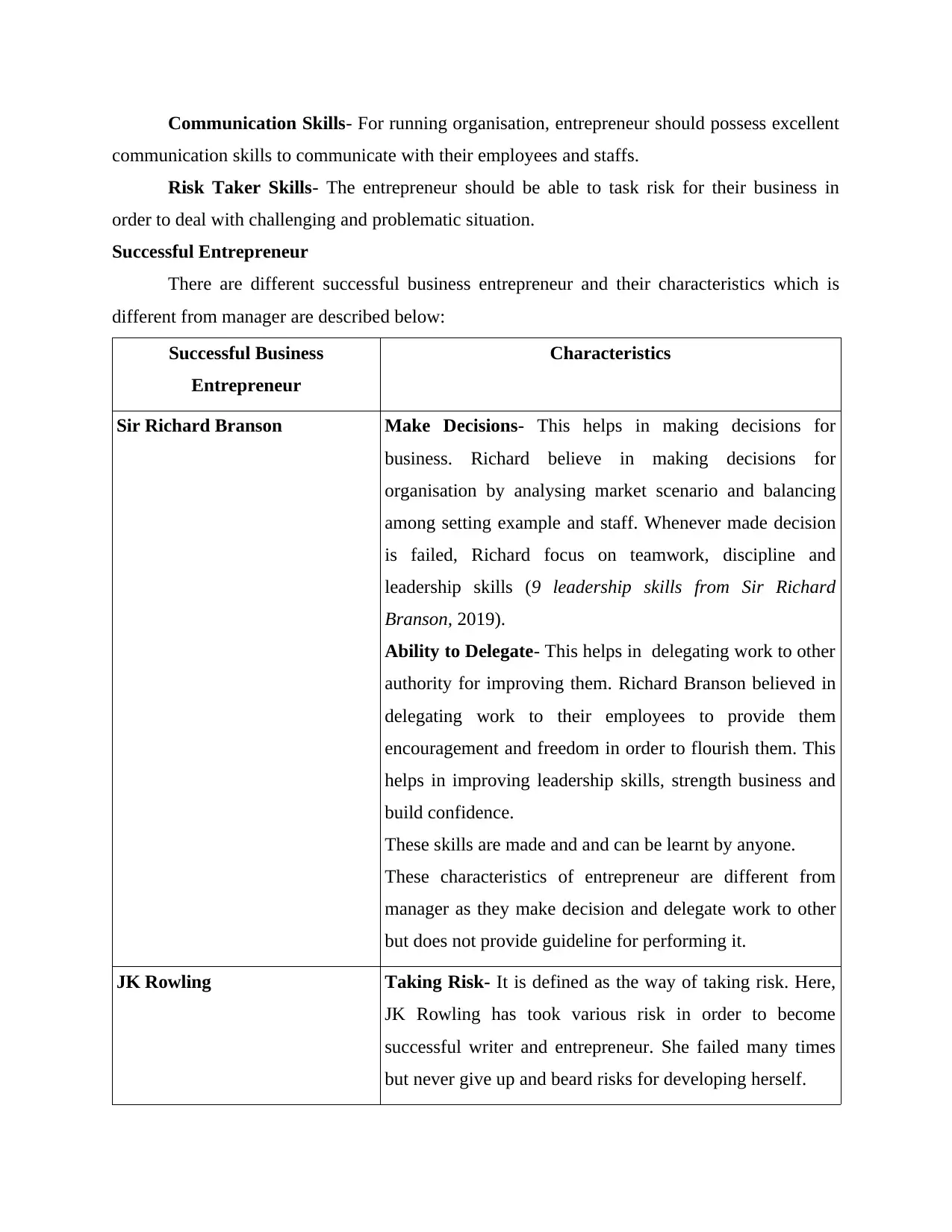
Communication Skills- For running organisation, entrepreneur should possess excellent
communication skills to communicate with their employees and staffs.
Risk Taker Skills- The entrepreneur should be able to task risk for their business in
order to deal with challenging and problematic situation.
Successful Entrepreneur
There are different successful business entrepreneur and their characteristics which is
different from manager are described below:
Successful Business
Entrepreneur
Characteristics
Sir Richard Branson Make Decisions- This helps in making decisions for
business. Richard believe in making decisions for
organisation by analysing market scenario and balancing
among setting example and staff. Whenever made decision
is failed, Richard focus on teamwork, discipline and
leadership skills (9 leadership skills from Sir Richard
Branson, 2019).
Ability to Delegate- This helps in delegating work to other
authority for improving them. Richard Branson believed in
delegating work to their employees to provide them
encouragement and freedom in order to flourish them. This
helps in improving leadership skills, strength business and
build confidence.
These skills are made and and can be learnt by anyone.
These characteristics of entrepreneur are different from
manager as they make decision and delegate work to other
but does not provide guideline for performing it.
JK Rowling Taking Risk- It is defined as the way of taking risk. Here,
JK Rowling has took various risk in order to become
successful writer and entrepreneur. She failed many times
but never give up and beard risks for developing herself.
communication skills to communicate with their employees and staffs.
Risk Taker Skills- The entrepreneur should be able to task risk for their business in
order to deal with challenging and problematic situation.
Successful Entrepreneur
There are different successful business entrepreneur and their characteristics which is
different from manager are described below:
Successful Business
Entrepreneur
Characteristics
Sir Richard Branson Make Decisions- This helps in making decisions for
business. Richard believe in making decisions for
organisation by analysing market scenario and balancing
among setting example and staff. Whenever made decision
is failed, Richard focus on teamwork, discipline and
leadership skills (9 leadership skills from Sir Richard
Branson, 2019).
Ability to Delegate- This helps in delegating work to other
authority for improving them. Richard Branson believed in
delegating work to their employees to provide them
encouragement and freedom in order to flourish them. This
helps in improving leadership skills, strength business and
build confidence.
These skills are made and and can be learnt by anyone.
These characteristics of entrepreneur are different from
manager as they make decision and delegate work to other
but does not provide guideline for performing it.
JK Rowling Taking Risk- It is defined as the way of taking risk. Here,
JK Rowling has took various risk in order to become
successful writer and entrepreneur. She failed many times
but never give up and beard risks for developing herself.
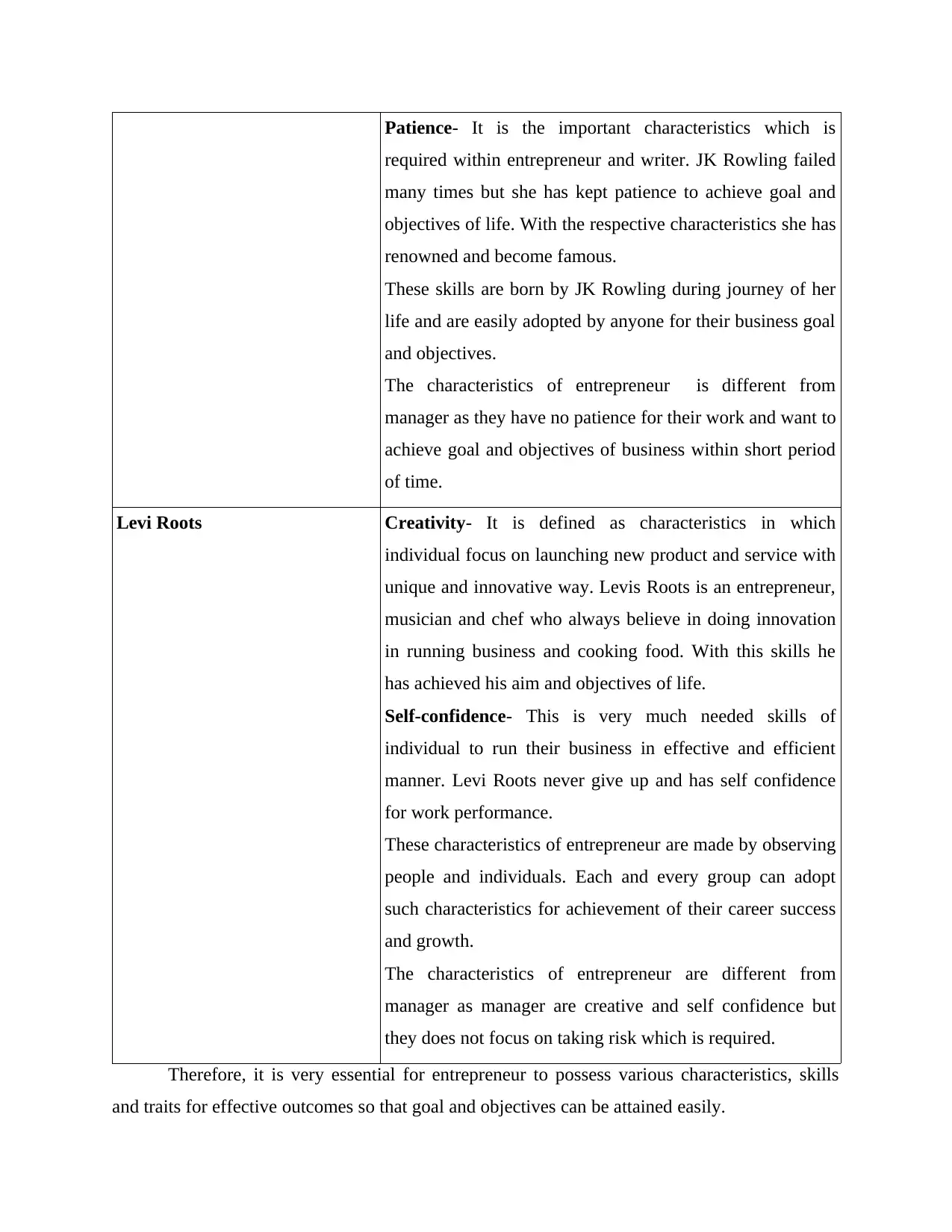
Patience- It is the important characteristics which is
required within entrepreneur and writer. JK Rowling failed
many times but she has kept patience to achieve goal and
objectives of life. With the respective characteristics she has
renowned and become famous.
These skills are born by JK Rowling during journey of her
life and are easily adopted by anyone for their business goal
and objectives.
The characteristics of entrepreneur is different from
manager as they have no patience for their work and want to
achieve goal and objectives of business within short period
of time.
Levi Roots Creativity- It is defined as characteristics in which
individual focus on launching new product and service with
unique and innovative way. Levis Roots is an entrepreneur,
musician and chef who always believe in doing innovation
in running business and cooking food. With this skills he
has achieved his aim and objectives of life.
Self-confidence- This is very much needed skills of
individual to run their business in effective and efficient
manner. Levi Roots never give up and has self confidence
for work performance.
These characteristics of entrepreneur are made by observing
people and individuals. Each and every group can adopt
such characteristics for achievement of their career success
and growth.
The characteristics of entrepreneur are different from
manager as manager are creative and self confidence but
they does not focus on taking risk which is required.
Therefore, it is very essential for entrepreneur to possess various characteristics, skills
and traits for effective outcomes so that goal and objectives can be attained easily.
required within entrepreneur and writer. JK Rowling failed
many times but she has kept patience to achieve goal and
objectives of life. With the respective characteristics she has
renowned and become famous.
These skills are born by JK Rowling during journey of her
life and are easily adopted by anyone for their business goal
and objectives.
The characteristics of entrepreneur is different from
manager as they have no patience for their work and want to
achieve goal and objectives of business within short period
of time.
Levi Roots Creativity- It is defined as characteristics in which
individual focus on launching new product and service with
unique and innovative way. Levis Roots is an entrepreneur,
musician and chef who always believe in doing innovation
in running business and cooking food. With this skills he
has achieved his aim and objectives of life.
Self-confidence- This is very much needed skills of
individual to run their business in effective and efficient
manner. Levi Roots never give up and has self confidence
for work performance.
These characteristics of entrepreneur are made by observing
people and individuals. Each and every group can adopt
such characteristics for achievement of their career success
and growth.
The characteristics of entrepreneur are different from
manager as manager are creative and self confidence but
they does not focus on taking risk which is required.
Therefore, it is very essential for entrepreneur to possess various characteristics, skills
and traits for effective outcomes so that goal and objectives can be attained easily.
⊘ This is a preview!⊘
Do you want full access?
Subscribe today to unlock all pages.

Trusted by 1+ million students worldwide
1 out of 16
Related Documents
Your All-in-One AI-Powered Toolkit for Academic Success.
+13062052269
info@desklib.com
Available 24*7 on WhatsApp / Email
![[object Object]](/_next/static/media/star-bottom.7253800d.svg)
Unlock your academic potential
Copyright © 2020–2025 A2Z Services. All Rights Reserved. Developed and managed by ZUCOL.





